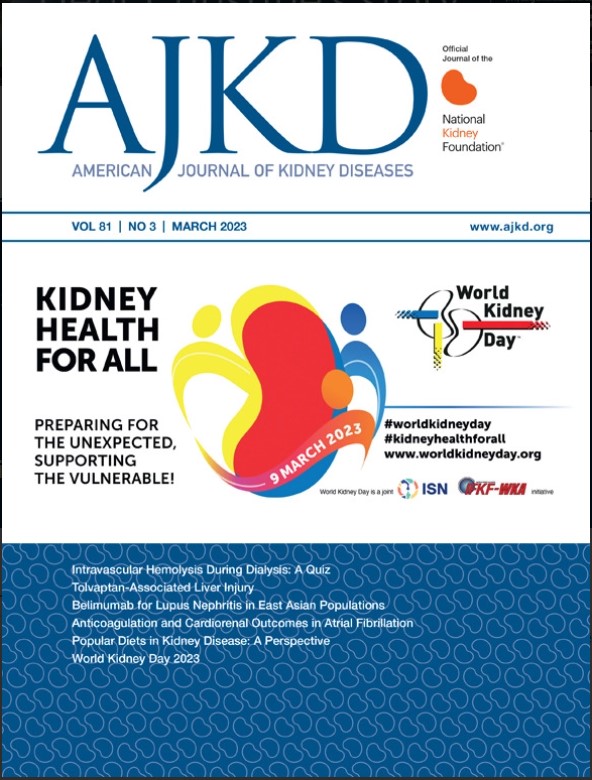Effectiveness of Bivalent mRNA COVID-19 Vaccine Among Adults With Kidney Failure Receiving Dialysis: A Cohort Study From the Centers for Medicare and Medicaid Services.
IF 8.2
1区 医学
Q1 UROLOGY & NEPHROLOGY
引用次数: 0
Abstract
RATIONAL & OBJECTIVE Patients with kidney failure treated with maintenance dialysis have an increased risk of severe disease due to SARS-CoV-2 infection, the virus that causes COVID-19. Previous studies have shown that COVID-19 vaccination is effective against severe COVID-19 illness in the general population. However, less is known about populations at greater risk for severe disease. This investigation examined the real-world effectiveness of bivalent mRNA COVID-19 vaccination against clinical outcomes among patients treated with maintenance dialysis. STUDY DESIGN Retrospective cohort study. SETTING & PARTICIPANTS Medicare Fee-for-Service (FFS) claims data for beneficiaries aged ≥18 years with kidney failure receiving maintenance dialysis between September 4, 2022, and April 1, 2023. EXPOSURE Bivalent mRNA COVID-19 vaccination compared with receipt of original monovalent COVID-19 doses alone. OUTCOMES Medically attended COVID-19, which was defined as the occurrence of a COVID-19-associated outpatient encounter, COVID-19-associated hospitalization, critical COVID-19 illness, or COVID-19-associated death, overall as well as each COVID-19-associated outcome individually. ANALYTICAL APPROACH Relative vaccine effectiveness against COVID-19-associated outcomes was calculated as 1 - adjusted hazard ratio, with the adjusted hazard ratio comparing rates of outcomes by vaccination status estimated using a weighted Cox regression model. RESULTS Compared with receipt of original monovalent COVID-19 vaccine doses, the relative estimated effectiveness of a bivalent mRNA COVID-19 vaccine dose was 41% (95% CI: 37%, 46%) against medically attended COVID-19, 49% (95% CI: 43%, 54%) against COVID-19-associated hospitalization, 53% (95% CI: 44%, 61%) against critical COVID-19 illness, and 54% (95% CI: 42%, 63%) against COVID-19-associated death among adults with kidney failure treated with maintenance dialysis without additional immunocompromising conditions. Estimated vaccine effectiveness against medically attended COVID-19 was 50% (95% CI: 44%, 55%) 7-59 days after bivalent vaccination and 33% (95% CI: 26%, 39%) 60-206 days after bivalent vaccination. LIMITATIONS Potential misclassification bias, residual confounding, and generalizability concerns may exist. CONCLUSIONS These findings suggest a bivalent mRNA COVID-19 vaccine dose provided protection against COVID-19 disease among previously vaccinated persons with kidney failure receiving maintenance dialysis, but the estimated effectiveness waned over time.二价mRNA COVID-19疫苗在接受透析的成人肾衰竭患者中的有效性:来自医疗保险和医疗补助服务中心的队列研究
原因与目的接受维持性透析治疗的肾衰竭患者因SARS-CoV-2感染(导致COVID-19的病毒)而发生严重疾病的风险增加。先前的研究表明,COVID-19疫苗接种对普通人群中严重的COVID-19疾病有效。然而,人们对患严重疾病风险更高的人群知之甚少。本研究考察了二价mRNA COVID-19疫苗接种对维持性透析患者临床结果的实际有效性。研究设计回顾性队列研究。背景和参与者:2022年9月4日至2023年4月1日期间接受维持性透析治疗的年龄≥18岁肾衰竭受益人的医疗保险按服务收费(FFS)索赔数据。暴露:二价mRNA COVID-19疫苗与单独接受原始单价COVID-19剂量的比较。医学上参加的COVID-19,定义为与COVID-19相关的门诊就诊、COVID-19相关的住院、COVID-19危重疾病或COVID-19相关死亡的发生,总体以及每种与COVID-19相关的结果。分析方法以1校正风险比计算疫苗对covid -19相关结局的相对有效性,并使用加权Cox回归模型估计疫苗接种状况的校正风险比比较结局率。结果与原始单价COVID-19疫苗剂量相比,二价mRNA COVID-19疫苗剂量对医疗参加的COVID-19的相对估计有效性为41% (95% CI: 37%, 46%),对COVID-19相关住院治疗的相对估计有效性为49% (95% CI: 43%, 54%),对COVID-19危重疾病的相对估计有效性为53% (95% CI: 44%, 61%),对COVID-19危重疾病的相对估计有效性为54% (95% CI:(42%, 63%)在接受维持性透析治疗的成人肾衰竭患者中与covid -19相关的死亡。二价疫苗接种后7-59天估计疫苗对医疗出席的COVID-19的有效性为50% (95% CI: 44%, 55%),二价疫苗接种后60-206天估计疫苗有效性为33% (95% CI: 26%, 39%)。局限性:可能存在潜在的误分类偏差、残留混淆和通用性问题。这些研究结果表明,二价mRNA COVID-19疫苗剂量对先前接种过维护性透析的肾衰竭患者提供了COVID-19疾病的保护,但估计的有效性随着时间的推移而减弱。
本文章由计算机程序翻译,如有差异,请以英文原文为准。
求助全文
约1分钟内获得全文
求助全文
来源期刊

American Journal of Kidney Diseases
医学-泌尿学与肾脏学
CiteScore
20.40
自引率
2.30%
发文量
732
审稿时长
3-8 weeks
期刊介绍:
The American Journal of Kidney Diseases (AJKD), the National Kidney Foundation's official journal, is globally recognized for its leadership in clinical nephrology content. Monthly, AJKD publishes original investigations on kidney diseases, hypertension, dialysis therapies, and kidney transplantation. Rigorous peer-review, statistical scrutiny, and a structured format characterize the publication process. Each issue includes case reports unveiling new diseases and potential therapeutic strategies.
 求助内容:
求助内容: 应助结果提醒方式:
应助结果提醒方式:


